Why pumpkin juice is good for men: prepare and use the healing drink correctly
Pumpkin is a valuable food product. It is consumed fresh, steamed, baked, salted, candied fruits and honey are prepared, and processed into juice and puree. The fruits of the plant have a unique chemical composition, due to which they have a positive effect on the condition and functions of the digestive, nervous, and urinary systems. Pumpkin juice is especially beneficial for men. It is necessary for the normal development of bone and muscle tissue, acts as an antioxidant, and is involved in the production of testosterone, the male sex hormone responsible for sexual health and libido.
In this article we will look in detail at the benefits of pumpkin juice for men, how to properly prepare and take it in order to get the maximum benefit without harm to health.
The benefits of pumpkin juice for the male body
Pumpkin juice has a beneficial, versatile effect on the body. Its benefits for men's health are obvious, since it contains zinc, arginine, and phosphorus. These biologically active components stimulate the production of male sex hormones, improve sperm quality, restore the physiological response to sexual arousal, and increase sexual activity.
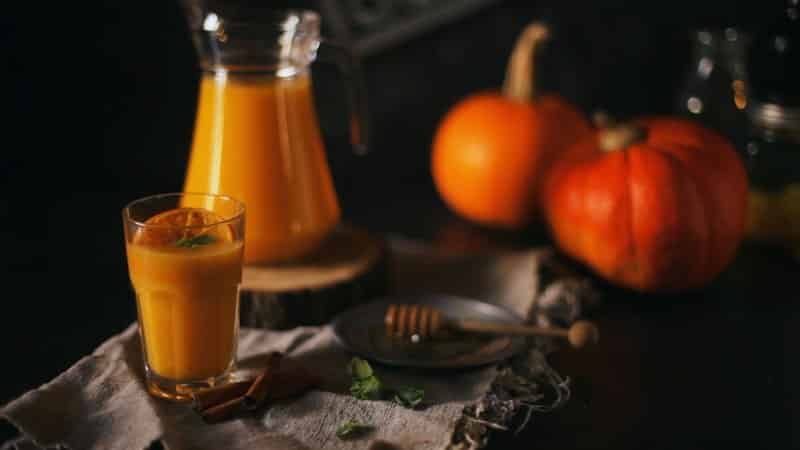
The pulp of the fruit is a source of calcium and potassium, which strengthen the skeletal system and joints, ensure normal relaxation and contraction of blood vessels and muscles, neuromuscular transmission of impulses, and take part in hormonal and intracellular secretion. Pumpkin juice is widely used to prevent atherosclerosis, ischemia, and hypertension.
Pumpkin juice has a beneficial effect on the gastrointestinal tract and urinary system: it activates metabolism, reduces cholesterol levels, restores liver activity, and removes toxic substances.
Other healing properties of the vegetable drink include the ability to restrain inflammatory processes, calm the nervous system, improve night's sleep, and increase the body's resistance to infections and adverse external and internal factors.
Reference. Pumpkin juice in combination with conservative therapy for various pathologies reduces the need for medications, their dosage and course of treatment, reduces the tendency for the disease to become chronic, and reduces the risk of complications and new relapses.
Composition and properties
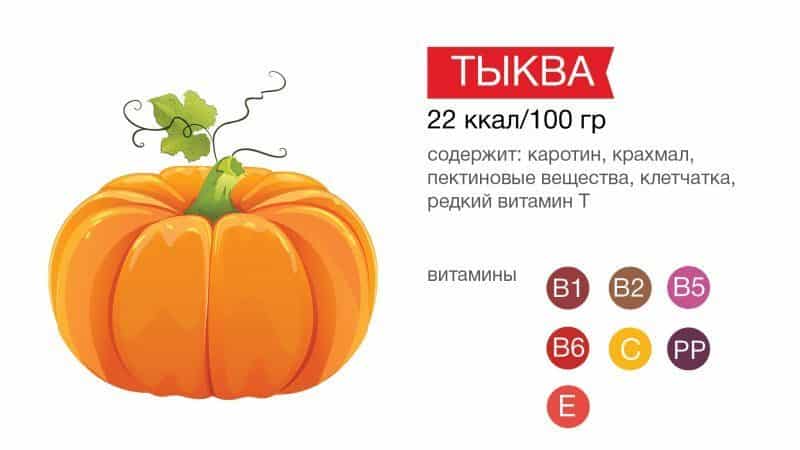
The beneficial properties of pumpkin are determined by its diverse chemical composition:
- Vitamin A - a powerful antioxidant. Slows down the aging process, participates in the formation of new cells, protects the membranes of brain cells, normalizes metabolism, restores and maintains epithelial tissue, accelerates wound healing. Good for the eyes, prevents the occurrence of cataracts.
- Vitamin B1 — necessary for the normal course of growth and development processes, maintaining the general condition and functions of the nervous and digestive systems, myocardium.
- Vitamin B2 - creates new blood cells, ensures normal iron levels in the body, improves the condition of the skin, hair, eyes, supports energy metabolism, regenerates and restores body tissues.
- Vitamin B3 (nicotinic acid) - participates in the metabolism of fats, proteins, amino acids, normalizes tissue respiration, improves microcirculation, dilates blood vessels, reduces cholesterol concentration, maintains healthy skin.
- Vitamin B6 - responsible for the absorption of proteins, fats, unsaturated fatty acids, improves the functioning of the liver, nervous system, takes part in metabolism, hematopoiesis, reduces cramps and muscle spasms, acts as a diuretic.
- Vitamin B9 (folic acid) - maintains the health of the circulatory and immune systems, reduces the risk of anemia, cancer, diarrhea, and depression. Normalizes sleep, improves mood, and has a positive effect on brain functionality.
- Vitamin E - supports the normal function of the gonads, protects the body from bacterial infection, regulates the aging process, and prevents the emergence of new radicals. In addition, it restores damaged liver cells and activates the functions of the immune system.
- Vitamin C (ascorbic acid) - strengthens small capillaries, increases the elasticity and strength of the walls of blood vessels, reduces their permeability. Involved in the metabolic process, necessary for the full functioning of the liver, kidneys, and heart.
- Pectin substances. They normalize metabolic processes, improve intestinal motility, neutralize toxic metals and radioactive elements. They also improve peripheral blood circulation and have minor anti-inflammatory and analgesic effects.
- Cellulose. Cleanses the gastrointestinal tract, liver, kidneys, blood, improves digestion, accelerates lipolysis and metabolism, provides a long-lasting feeling of satiety, which allows you to reduce the size of portions and give up snacking.
Pumpkin fruits contain large quantities of microelements (zinc, magnesium, fluorine, cobalt, iron, copper) and macroelements (calcium, potassium, sodium, magnesium, phosphorus, chlorine, sulfur).
Therapeutic effect for various diseases
Traditional medicine recommends using pumpkin juice for treatment and prevention diseases of the digestive, nervous, genitourinary systems, heart muscle.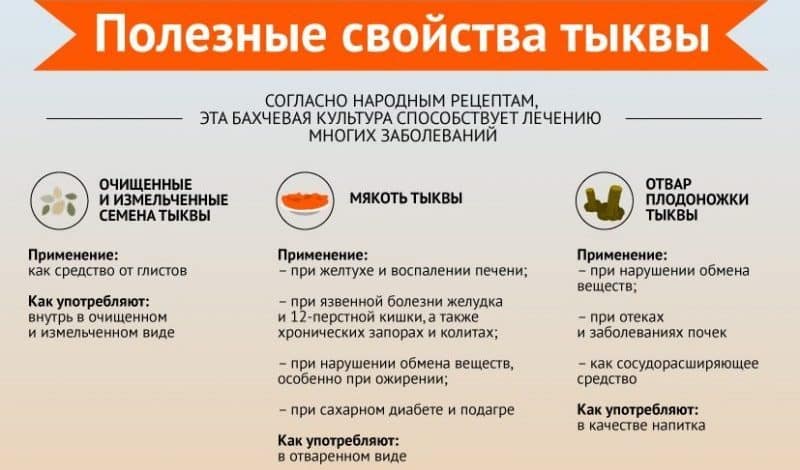
Let's consider the benefits of a vegetable drink in the case of a specific pathology:
- Prostatitis. Inhibits the inflammatory process, destroys and prevents further progression and proliferation of infection, normalizes metabolism and blood circulation, and eliminates congestion.
- Gout and other rheumatic diseases. Relieves acute gouty attacks, lowers the concentration of uric acid in the blood, and prevents the deposition of urate in the joints and kidneys. Increases motor activity, neutralizes signs of inflammation (edema, swelling).
- Atherosclerosis, ischemia. Improves the rheological properties of blood, the condition of the walls of blood vessels: increases their elasticity, firmness, reduces permeability, regulates cholesterol levels.
- Hypertension. Returns blood pressure to normal levels, activates the functions of the central nervous system, cardiovascular system, and kidneys.
- Diabetes. Normalizes metabolic processes, removes radioactive and toxic metals from the body, neutralizes free radicals, and takes an active part in the production of insulin.
- Obesity. Saturates the body with useful vitamins and microelements, cleanses of waste and toxins, removes excess fluid, and starts metabolism. Improves the functioning of the gastrointestinal tract, cleanses the liver, kidneys, and blood.
- Worms. Affects parasites, including tapeworms, causes muscle paralysis and neuromuscular blockade of helminths.
- Liver pathologies and edema. Due to its diuretic properties, it reduces the fluid content in tissues and serous cavities, increases the liver’s resistance to the aggressive effects of external and internal factors. It also restores impaired lipid metabolism, reduces cholesterol concentrations, increases the intensity of organ regeneration, and enhances the detoxification properties of the liver.
- Haemorrhoids. Improves the microflora of the large intestine, has a laxative effect, facilitates the process of defecation, stimulates intestinal motility, and acts as an antioxidant.
Pumpkin juice is used as an adjuvant in the treatment of nervous disorders, atopic dermatitis, impotence, cholecystitis, and heart failure.
Important! Pumpkin juice is especially useful in the autumn-winter period. It replenishes the deficiency of vitamins, micro- and macroelements in the body, strengthens antimicrobial immunity, reducing the risk of infection.
How to make pumpkin juice
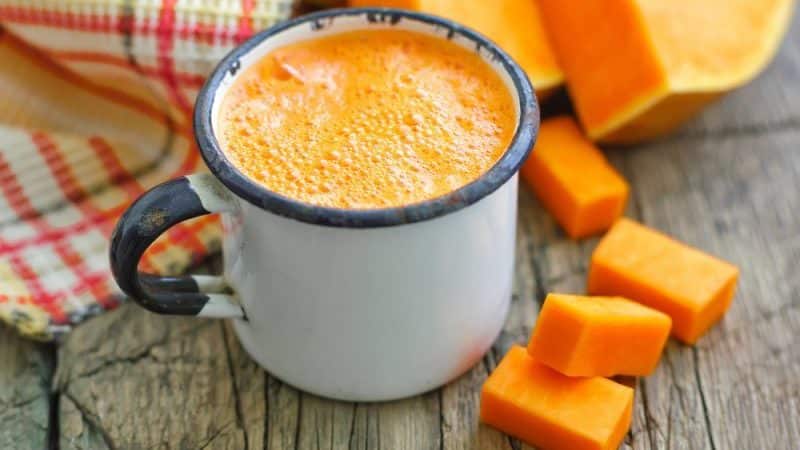
To prepare a vegetable drink, it is better to take fruits grown without pesticides. The drink is preserved for the winter in a glass container or prepared in portions.
There are several ways to make pumpkin juice:
- Cut the pumpkin pulp without peel into small cubes and squeeze out the juice using a juicer. Add honey, sugar, lemon juice, cream to taste.
- Wash the pumpkin, remove the peel and seeds, cut into small pieces to yield 1 kg of pulp. Prepare syrup from 1 liter of water and 200 g of sugar, bring to a boil, pour over the pumpkin, blanch for 5-10 minutes until the vegetable becomes soft. Transfer the cooled pumpkin into a separate container, use a blender to puree, dilute with syrup in a 1:1 ratio. To improve the taste, you can add 500 ml of orange juice. Put it on the fire again, after boiling, boil for 2-3 minutes. Serve chilled.
- Prepare juice from peeled and sliced pumpkin using a juicer. Add sugar at the rate of 3-5 tbsp. l. for 1 liter of juice, bring to a boil, simmer over low heat for 5 minutes. The drink can be consumed after cooling or poured hot into sterilized jars.
- Grate 1 kg of peeled pumpkin on a coarse grater, transfer to a metal container, and fill with distilled water to the level of the pumpkin. Cook over low heat until soft. Add your choice of lemon juice or zest, and use a blender to puree the ingredients. Add sugar to taste, water, if the drink is very thick, put on fire, after boiling, cook for 5-10 minutes.
How to use pumpkin juice to support men's health
The optimal daily intake of the drink is determined by the general state of health, the person’s age, the stage of the disease, and the goals of therapy. For medicinal purposes, it is recommended to consume 200-250 ml of the drink, but not more than 400 ml per day. It is better to do this at night, before going to bed. To prevent diseases, 100-200 ml of juice is enough.
Pumpkin juice goes well with other vegetable and fruit drinks. It can be diluted at your choice beetroot, apple, carrot, orange, celery juice. For greater benefit when preparing a drink in portions, add sugar replace with honey (if you are not allergic to it), add a few drops of lemon juice.

Terms and conditions of storage
It is better not to store the juice, but to prepare a fresh portion every day. Shelf life freshly squeezed juice at room temperature is 1-2 hours, in the refrigerator at a temperature from +2 to +7 degrees - 12-24 hours in a sealed plastic or vacuum container. When frozen, the juice is stored longer, but not more than 12 months, while the healing properties and chemical composition remain unchanged.
Contraindications
An absolute contraindication to drinking pumpkin juice is individual intolerance. It should be prescribed with caution if there is a history of diseases such as:
- gastritis with high acidity;
- acute urolithiasis;
- diabetes 1 type;
- diarrhea;
- formation of large stones in the gall bladder, bile ducts;
- inflammatory processes in the gastrointestinal tract during exacerbation.
Reviews
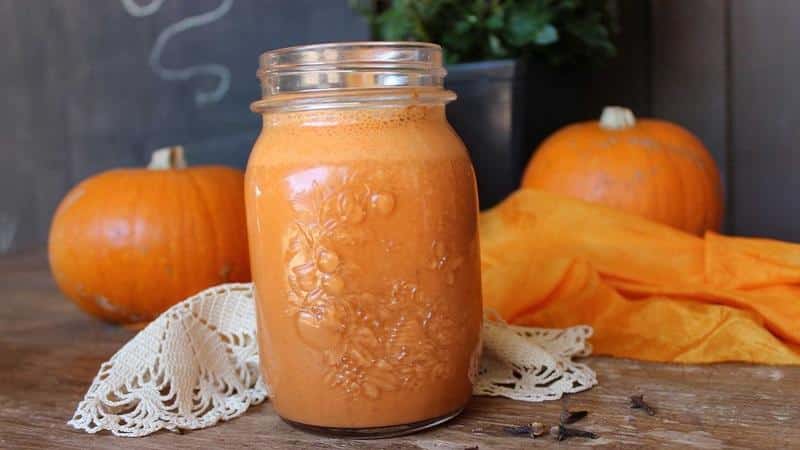
People's opinions about harm and benefit pumpkin juice are ambiguous. The result depends on various factors and the patient’s condition (age, gender, presence of concomitant pathologies), the causes and characteristics of the course of the disease, and the main treatment regimen.
Positive reviews confirm the effectiveness of the vegetable drink in the treatment and prevention of diseases of the gastrointestinal tract, nervous system, heart and blood vessels. Reviews from men indicate that pumpkin juice improves potency and erection. Negative opinions are associated with a lack of effect. And only isolated cases report the occurrence of adverse reactions.
Alexey Chernyshov, 45 years old: “I love pumpkin in any form.To diversify the menu, my wife makes her own pumpkin juice. A very tasty treat. The usefulness for a specific organ or system is difficult to assess, but it is a fact that general well-being has improved, endurance and ability to work have increased, and stool has normalized. Drinking the drink dulls the feeling of hunger, and there is no desire to snack between main meals. The result is minus 2.5 kg per month, without changing the daily diet.”
Ilya Proskurenko, 53 years old: “A useless drink in the treatment of prostatitis. It cannot be taken on its own, without medications, and in combination with drugs it is difficult to objectively assess its effect. The positive thing is that it tastes good, is inexpensive and easy to prepare at home. I didn’t notice any side effects.”
Conclusion
Pumpkin juice is a storehouse of vitamins, minerals, micro- and macroelements necessary for the normal functioning of the digestive, cardiovascular, urinary, nervous systems, and metabolism. It acts as an antioxidant, has anti-inflammatory, capillary protective, hepatoprotective properties.
Despite all the positive properties, the use of pumpkin has contraindications, the presence of which must be clarified before starting treatment. Therefore, in order to achieve a positive result in the treatment/prevention of various diseases, the question of the advisability of drinking pumpkin juice should be discussed with a doctor.